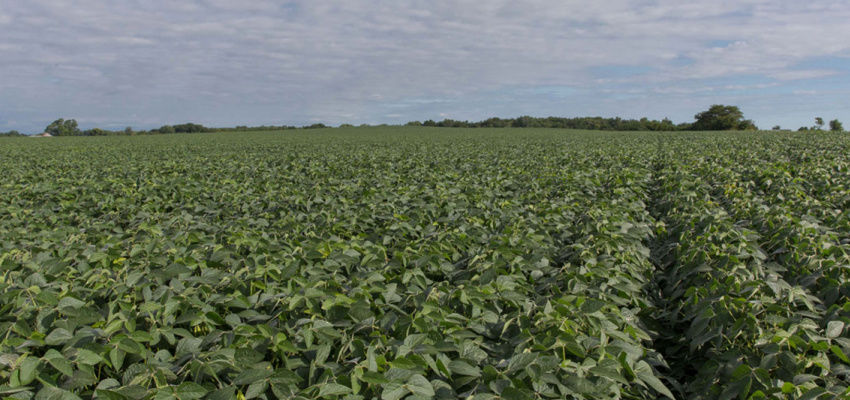The United States Soybean Export Council, United Soybean Board and the American Soybean Association announced July 22 that a milestone has been passed: More than 100 million metric tons of U.S. Soy Sustainability Assurance Protocol verified soy has been exported internationally over the seven years since the protocol was launched in 2014.
In 2014, the program’s first year, only 6,845 metric tons were shipped with a SSAP certificate. However, the adoption of the SSAP has grown exponentially since its inception, with 65 U.S. exporters issuing SSAP certificates for 25.8 million metric tons of U.S. soy in the 2021 marketing year, and cumulatively 100 million metric tons from 2014 to 2021. USSEC’s reporting found that the north Asia and Europe regions request a SSAP verified certificate for nearly 100% of their purchases.
With the growing demand for sustainable soy globally, the SSAP has been recognized as compliant with the European Feed Manufacturers’ Federation Soy Sourcing Guidelines, the Olympic and Paralympic Games Tokyo 2020 Organizing Committee’s sustainable sourcing code for agricultural products, the Consumer Goods Forum and the Global Seafood Alliance’s Best Aquaculture Practices for the Olympic and Paralympic Games.
“As consumer consciousness about health, the environment, and the need to meet global nutrition and food security continue to drive demand for nutritious and sustainable protein, the U.S. SSAP enables our global food, feed, consumer packaged goods, and retail sector customers with verified sustainable U.S. Soy,” said Jim Sutter, CEO of the U.S. Soybean Export Council. “A reliable supply of high-quality, sustainably-produced U.S. soy plays a vitally important role in enabling families and the food-feed industry around the world to feed our growing planet sustainably, and U.S. soy farmers are up to the challenge.”
"Our SSAP certified soybean oil imported from the U.S. has been used as a concrete release agent for the Tokyo 2020 Olympic main stadium and relevant facilities,” Saitama Ryokoku Company, a grain and feed wholesaler in Japan, said in a statement. “Interest toward environmentally-friendly initiatives and the U.N. Sustainable Development Goals is increasing in Japan, and we will continue to supply SSAP certified soybean oil and soybeans in our sales activities to add value to our customers."
The U.S. soy industry–including U.S. soybean farmers, processors, commodity shippers, merchandisers, allied food and agriculture organizations working together alongside non-governmental organizations–jointly developed the independently audited SSAP to back up U.S. soybean farmers’ commitment to sustainability. Each year, U.S. farmers perform an annual internal audit, which is reviewed by third-party, independent audits conducted by the U.S. Department of Agriculture. About 20,000 independent audits are conducted each year. The SSAP outlines and measures sustainable production practices, biodiversity, public and labor health, and continuous improvement of farming practices.
“U.S. soy farmers have pursued sustainable practices for decades for the benefit of their businesses, the planet and our society as a whole,” said Polly Ruhland, CEO of the United Soybean Board. “It’s farmers’ innate stewardship to grow more with less and sustain their land and soils for the next generation. The milestone of 100 million metric tons of SSAP verified shipments is proof of how our farmers are striving to be global leaders in sustainability. The Olympic Games provide an international stage to demonstrate how U.S. soy farmers and industry embrace climate smart agriculture to further increase sustainability.”
With U.S. soy that is verified sustainable under the SSAP, companies have a competitive advantage buying U.S. soy compared to soy from other countries of origin. The opportunity to use a trademarked “Sustainable U.S. Soy” logo on product packaging is offered to companies that source this sustainable ingredient in their products, verified through the SSAP. Currently, more than 30 companies use the Sustainable U.S. Soy logo on more than 550 products to inform their consumers and/or customers of their sustainability credentials and differentiate from the competition.
“America’s soybean growers are dedicated to the sustainability of our environment, society, and economy. The SSAP is a vital part of this commitment and, as a result, continues to gain global food industry and institutional recognition,” said Stephen Censky, CEO of the American Soybean Association.
The United Nations adopted “The 2030 Agenda for Sustainable Development” and 17 sustainable development goals in 2015. The Organizing Committee for the Olympic and Paralympic Games stated a commitment to delivering events that contribute to the U.N. SDGs. To implement these goals, Tokyo 2020 formulated the Sustainable Sourcing Code as a tool to ensure sustainability throughout the supply chains of products and services the Olympics procures as well as licensed products. It also defined the individual criteria for the sourcing of timber, agricultural products, livestock products, fishery products, paper, and palm oil.
To learn more about the U.S. Soy Sustainability Assurance Protocol, visit www.ussoy.org and www.ussec.org.


